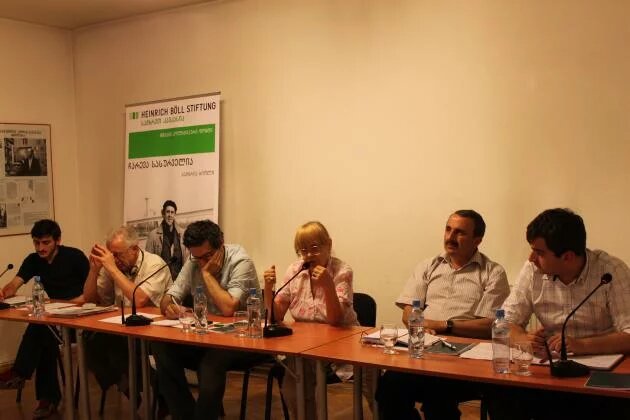
12 July, 2012
This discussion held at HBF’s South Caucasus Regional Office concerned archives. What is the knowledge that can be generated, or what is the knowledge preserved by, archives? How can researchers or regular citizens find information and read case materials? What are the problems regarding this issue in Georgia and Russia? Several guests from Russia participated in the discussion, and a key theme revolved around government and civic efforts regarding archives. Another issue concerned citizens’ interest in this period of history, the years of repression, and the materials associated with it.
From the discussion, it seems as though public interest towards this issue has increased. Since the 1990s, researchers have had free access to FSB (Federal Safety Bureau) archives. Irina Osipova, a member of an organization known as “Memorial”, recalls that at the beginning of Putin’s regime, central as well as regional archives were officially closed. She spoke of the Bolshevik terror period and problems associated with Russian archives today.
Valentin Gefter, director of the Human Rights Institute and member of the Civil Society Development and Human Rights Board of the President of the Russian Federation spoke about his activities with the Russian “Memorial”. He also noted that preservation of memory as well as evaluation of the totalitarian past cannot simply be achieved only by civic efforts. Gefter argued that the government has a duty to play a role in this process.
After so many years since the fall of the Soviet Union, neither Georgia nor Russia has state memorials for victims of totalitarian repression. Legal evaluation of the Soviet past is also problematic. According to Gefter, “we wanted the state to recognize that its repression is a crime without a statute of limitations; it can be referred to as genocide or a crime against humanity. Our purpose is to explain to our contemporaries that we are responsible for remembering all of this, and we need to tell the state that it often repeats the old practices and approaches. In order for this not to continue, the state, together with the public, should recognize that this practice is a crime.”
What place do individuals occupy in these stories, and what kind of information do these documents preserve about humans and humanity in general? Irakli Khvadagiani spoke about these topics, and he reviewed the technical and legal problems with the Georgian archives, along with David Jishkariani.
Omar Tushurashvili, director of the Archives of the Ministry of Internal Affairs, recalled the most difficult time for this institution. In 1991, up to 80% of archive was destroyed during the civil war in Tbilisi. He also spoke about the efforts of the management of the archives to eliminate current problems. At the end of his talk, Tushurashvili addressed the Georgian public’s indifferent attitude towards archive documents. While the archives in Georgia are open, enabling this work, unlike Russia, which still publishes numerous documents and books about Soviet history, Georgia has significantly less interest in this period. Therefore, the archives also lack public attention.